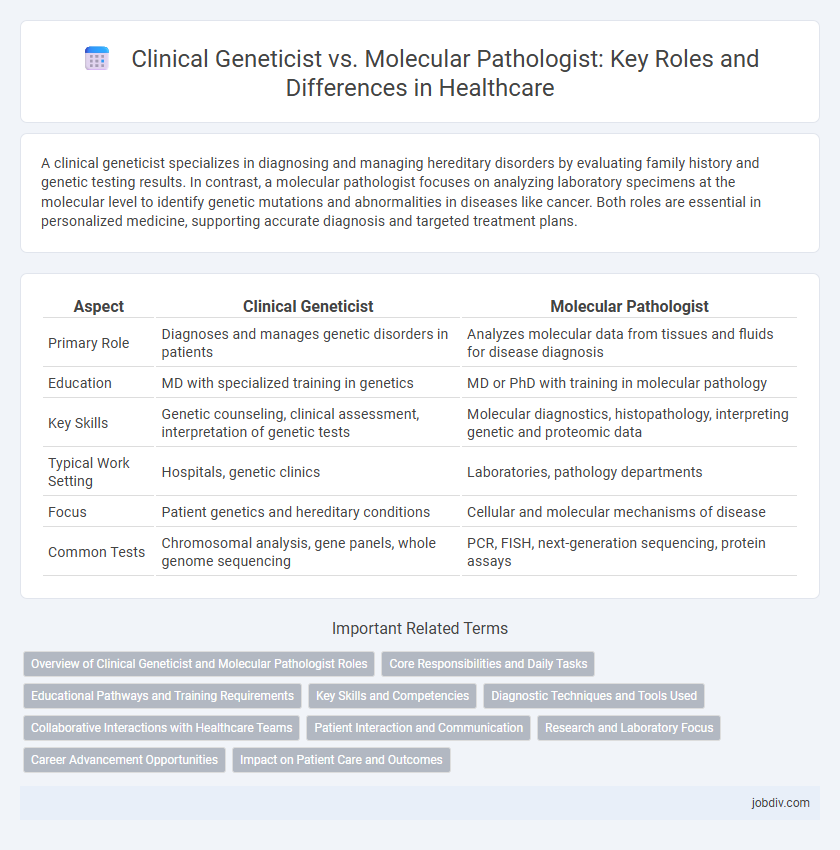A clinical geneticist specializes in diagnosing and managing hereditary disorders by evaluating family history and genetic testing results. In contrast, a molecular pathologist focuses on analyzing laboratory specimens at the molecular level to identify genetic mutations and abnormalities in diseases like cancer. Both roles are essential in personalized medicine, supporting accurate diagnosis and targeted treatment plans.
Table of Comparison
| Aspect | Clinical Geneticist | Molecular Pathologist |
|---|---|---|
| Primary Role | Diagnoses and manages genetic disorders in patients | Analyzes molecular data from tissues and fluids for disease diagnosis |
| Education | MD with specialized training in genetics | MD or PhD with training in molecular pathology |
| Key Skills | Genetic counseling, clinical assessment, interpretation of genetic tests | Molecular diagnostics, histopathology, interpreting genetic and proteomic data |
| Typical Work Setting | Hospitals, genetic clinics | Laboratories, pathology departments |
| Focus | Patient genetics and hereditary conditions | Cellular and molecular mechanisms of disease |
| Common Tests | Chromosomal analysis, gene panels, whole genome sequencing | PCR, FISH, next-generation sequencing, protein assays |
Overview of Clinical Geneticist and Molecular Pathologist Roles
Clinical geneticists specialize in diagnosing and managing hereditary disorders by evaluating family histories and genetic test results to provide personalized treatment plans and genetic counseling. Molecular pathologists analyze genetic materials at the molecular level through laboratory techniques such as DNA sequencing and PCR to identify mutations and disease markers crucial for targeted therapies. While clinical geneticists focus on patient-centered assessment and counseling, molecular pathologists emphasize laboratory-based diagnostics to guide clinical decision-making in precision medicine.
Core Responsibilities and Daily Tasks
Clinical geneticists primarily diagnose and manage inherited disorders by interpreting genetic test results and counseling patients on genetic risks. Molecular pathologists focus on analyzing molecular and genetic markers in tissues and fluids to identify diseases at the cellular level, often working closely with lab technologies such as PCR and next-generation sequencing. Both specialists collaborate to integrate genetic information into personalized patient care, but their core responsibilities differ in patient interaction versus laboratory diagnostics.
Educational Pathways and Training Requirements
Clinical geneticists must complete medical school followed by residency training in medical genetics, which typically lasts 2 to 3 years, focusing on diagnosing inherited disorders. Molecular pathologists undergo medical school and residency in pathology, with additional fellowship training in molecular diagnostics that emphasizes genetic testing techniques and disease mechanisms at the DNA level. Both specialties require board certification, but clinical geneticists prioritize patient-facing genetic counseling, while molecular pathologists concentrate on laboratory-based molecular analysis.
Key Skills and Competencies
Clinical Geneticists specialize in diagnosing and managing hereditary disorders, requiring expertise in genetic counseling, chromosomal analysis, and patient communication skills. Molecular Pathologists focus on analyzing molecular and genetic markers to diagnose diseases, emphasizing proficiency in laboratory techniques, molecular diagnostics, and bioinformatics. Both professionals demand a strong foundation in genomics, critical thinking, and interdisciplinary collaboration to provide accurate diagnoses and inform treatment strategies.
Diagnostic Techniques and Tools Used
Clinical geneticists primarily utilize karyotyping, chromosomal microarray analysis, and next-generation sequencing to diagnose hereditary disorders by studying patient family histories and genetic variations. Molecular pathologists focus on analyzing tissue samples using techniques such as polymerase chain reaction (PCR), fluorescence in situ hybridization (FISH), and immunohistochemistry to detect molecular alterations associated with diseases like cancer. Both specialists employ advanced genomic technologies, but clinical geneticists emphasize inherited conditions, while molecular pathologists specialize in disease pathogenesis at the molecular level.
Collaborative Interactions with Healthcare Teams
Clinical geneticists and molecular pathologists collaborate closely with healthcare teams to enhance patient diagnosis and treatment through genetic insights. Clinical geneticists interpret hereditary disease patterns and provide genetic counseling, while molecular pathologists analyze molecular and genetic data from tissue samples to identify disease markers. Their combined expertise supports personalized medicine by guiding targeted therapies and improving patient care outcomes in multidisciplinary clinical settings.
Patient Interaction and Communication
Clinical Geneticists specialize in direct patient interaction, conducting detailed consultations to interpret genetic tests and provide personalized counseling on inherited conditions. Molecular Pathologists primarily analyze genetic data in the laboratory, communicating findings to healthcare providers rather than patients. Effective patient communication by Clinical Geneticists enhances understanding of genetic risks and informed decision-making, whereas Molecular Pathologists support this process through precise diagnostic insights.
Research and Laboratory Focus
A Clinical Geneticist specializes in diagnosing and managing hereditary disorders through patient evaluation and genetic counseling, emphasizing clinical research and phenotype-genotype correlations. In contrast, a Molecular Pathologist focuses on analyzing molecular and genetic abnormalities in tissues and cells using advanced laboratory techniques such as next-generation sequencing and PCR to identify disease mechanisms and develop targeted therapies. Both professionals collaborate in translational research to advance precision medicine by integrating clinical insights with molecular data.
Career Advancement Opportunities
Clinical Geneticists have career advancement opportunities through specialization in rare genetic disorders, involvement in predictive medicine, and leadership roles in genetic counseling teams. Molecular Pathologists advance by integrating genomic technologies with diagnostic pathology, leading translational research projects, and directing molecular diagnostics laboratories. Both professions benefit from continuous education in genomics and bioinformatics, expanding their expertise to meet evolving precision medicine demands.
Impact on Patient Care and Outcomes
Clinical geneticists specialize in diagnosing and managing inherited disorders through patient evaluations and genetic counseling, directly improving personalized treatment plans and family risk assessments. Molecular pathologists analyze genetic material at the molecular level to identify disease-causing mutations, guiding targeted therapies and precise diagnostic decisions. Their combined expertise enhances accuracy in diagnosis, informs effective treatment strategies, and ultimately improves patient outcomes in genetic and molecular disorders.
Clinical Geneticist vs Molecular Pathologist Infographic

 jobdiv.com
jobdiv.com